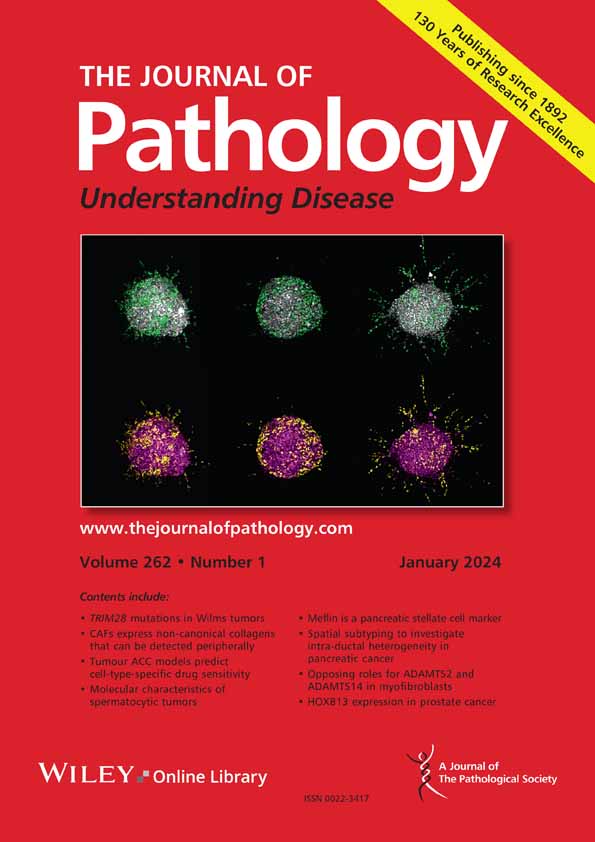CDK4/6 inhibitor modulating active and quiescent intestinal stem cells for prevention of chemotherapy-induced diarrhea
Jinnan Xiang, Haoyu Wang, Qianqian Tao, Wenxi Li, Yanfei Huang, Yushuo Zhang, Linan Yang, Shiyi Zhang
求助PDF
{"title":"CDK4/6 inhibitor modulating active and quiescent intestinal stem cells for prevention of chemotherapy-induced diarrhea","authors":"Jinnan Xiang, Haoyu Wang, Qianqian Tao, Wenxi Li, Yanfei Huang, Yushuo Zhang, Linan Yang, Shiyi Zhang","doi":"10.1002/path.6078","DOIUrl":null,"url":null,"abstract":"<p>Chemotherapy-induced diarrhea causes dehydration, debilitation, infection, and even death, but there are currently no Food and Drug Administration (FDA)-approved drugs for treatment of chemotherapy-induced diarrhea. It is generally believed that the timely regulation of intestinal stem cell (ISC) fate may provide a meaningful solution for intestinal injuries. However, the lineage plasticity of ISCs during and after chemotherapy remains poorly understood. Here, we demonstrated that palbociclib, a cyclin-dependent kinase 4/6 (CDK4/6) inhibitor, regulated the fate of active or quiescent ISCs, provided multilineage protection from the toxicity of several different chemotherapeutics, and accelerated gastrointestinal epithelium recovery. Consistent with <i>in vivo</i> results, we determined that palbociclib enhanced intestinal organoid and <i>ex vivo</i> tissue survival after chemotherapy. Lineage tracing studies have shown that palbociclib protects active ISCs marked by Lgr5 and Olfm4 during chemotherapy and unexpectedly activates quiescent ISCs marked by Bmi1 to immediately participate in crypt regeneration after chemotherapy. Furthermore, palbociclib does not decrease the efficacy of cytotoxic chemotherapy in tumor grafts. The experimental evidence suggests that the combination of CDK4/6 inhibitors with chemotherapy could reduce damage to the gastrointestinal epithelium in patients. © 2023 The Pathological Society of Great Britain and Ireland.</p>","PeriodicalId":232,"journal":{"name":"The Journal of Pathology","volume":"260 3","pages":"235-247"},"PeriodicalIF":5.2000,"publicationDate":"2023-03-28","publicationTypes":"Journal Article","fieldsOfStudy":null,"isOpenAccess":false,"openAccessPdf":"","citationCount":"1","resultStr":null,"platform":"Semanticscholar","paperid":null,"PeriodicalName":"The Journal of Pathology","FirstCategoryId":"3","ListUrlMain":"https://onlinelibrary.wiley.com/doi/10.1002/path.6078","RegionNum":2,"RegionCategory":"医学","ArticlePicture":[],"TitleCN":null,"AbstractTextCN":null,"PMCID":null,"EPubDate":"","PubModel":"","JCR":"Q1","JCRName":"ONCOLOGY","Score":null,"Total":0}
引用次数: 1
引用
批量引用
Abstract
Chemotherapy-induced diarrhea causes dehydration, debilitation, infection, and even death, but there are currently no Food and Drug Administration (FDA)-approved drugs for treatment of chemotherapy-induced diarrhea. It is generally believed that the timely regulation of intestinal stem cell (ISC) fate may provide a meaningful solution for intestinal injuries. However, the lineage plasticity of ISCs during and after chemotherapy remains poorly understood. Here, we demonstrated that palbociclib, a cyclin-dependent kinase 4/6 (CDK4/6) inhibitor, regulated the fate of active or quiescent ISCs, provided multilineage protection from the toxicity of several different chemotherapeutics, and accelerated gastrointestinal epithelium recovery. Consistent with in vivo results, we determined that palbociclib enhanced intestinal organoid and ex vivo tissue survival after chemotherapy. Lineage tracing studies have shown that palbociclib protects active ISCs marked by Lgr5 and Olfm4 during chemotherapy and unexpectedly activates quiescent ISCs marked by Bmi1 to immediately participate in crypt regeneration after chemotherapy. Furthermore, palbociclib does not decrease the efficacy of cytotoxic chemotherapy in tumor grafts. The experimental evidence suggests that the combination of CDK4/6 inhibitors with chemotherapy could reduce damage to the gastrointestinal epithelium in patients. © 2023 The Pathological Society of Great Britain and Ireland.
CDK4/6抑制剂调节活性和静止肠道干细胞预防化疗诱导的腹泻
化疗引起的腹泻会导致脱水、虚弱、感染,甚至死亡,但目前还没有美国食品药品监督管理局(FDA)批准的治疗化疗引起的痢疾的药物。人们普遍认为,及时调节肠道干细胞(ISC)的命运可能为肠道损伤提供有意义的解决方案。然而,化疗期间和化疗后ISCs的谱系可塑性仍知之甚少。在这里,我们证明了palbociclib,一种细胞周期蛋白依赖性激酶4/6(CDK4/6)抑制剂,调节活性或静止ISCs的命运,提供多种不同化疗药物毒性的多谱系保护,并加速胃肠上皮的恢复。与体内结果一致,我们确定帕博西立可提高化疗后肠道类器官和离体组织的存活率。谱系追踪研究表明,帕博昔单抗在化疗期间保护以Lgr5和Olfm4标记的活动ISC,并意外地激活以Bmi1标记的静止ISC,以立即参与化疗后的隐窝再生。此外,帕博西立布不会降低肿瘤移植物细胞毒性化疗的疗效。实验证据表明,CDK4/6抑制剂与化疗相结合可以减少患者胃肠道上皮的损伤。©2023大不列颠及爱尔兰病理学会。
本文章由计算机程序翻译,如有差异,请以英文原文为准。


